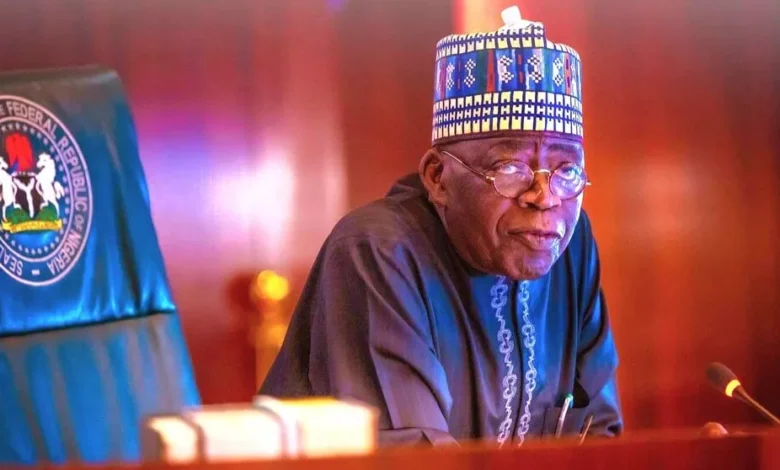Bola Ahmed Tinubu: The Political Titan Shaping Nigeria’s Future 2024

Introduction
Bola Ahmed Tinubu, often called the “Jagaban,” is a towering figure in Nigerian politics. With an impressive track record of political achievements, Tinubu’s influence extends beyond the borders of Lagos State, where he served as governor for eight years, to the entire nation. As a strategist, leader, and kingmaker, Tinubu has played pivotal roles in the emergence of several political leaders in Nigeria. This article delves into the life, career, and influence of Bola Ahmed Tinubu, exploring how his leadership style and political manoeuvres have shaped the contemporary Nigerian political landscape.
Early Life and Education
Born on March 29, 1952, in Lagos, Bola Ahmed Tinubu early years were marked by a quest for education and excellence. Before moving to the United States for higher studies, he attended St. John’s Primary School in Aroloya, Lagos. Tinubu earned a Bachelor’s degree in Accounting from Chicago State University. His educational background laid the foundation for a career that initially began in the private sector but would eventually take a dramatic turn towards public service and politics.
Career Beginnings and Rise in Politics
Tinubu’s professional journey began with various roles in finance and accounting, working for renowned firms such as Deloitte, Haskins & Sells, and Mobil Oil Nigeria. His foray into politics started in the late 1980s when he became a member of the Social Democratic Party (SDP). His early political career saw him elected as a Senator representing Lagos West in 1993, a position he held until the controversial annulment of the June 12 presidential elections by the military regime of General Ibrahim Babangida.
The annulment of the elections and the subsequent political turmoil transformed Tinubu into a pro-democracy advocate. He became an active member of the National Democratic Coalition (NADECO), which championed the revalidation of the June 12 election results and fought against military rule. His activism forced him into exile during General Sani Abacha’s regime, but he returned to Nigeria in 1998 after the dictator’s death.
Governor of Lagos State: Reforms and Achievements
Bola Ahmed Tinubu’s political influence grew significantly when he was elected Governor of Lagos State in 1999 under the platform of the Alliance for Democracy (AD). His tenure as governor was marked by significant reforms that transformed Lagos into a modern metropolis. Tinubu’s administration focused on infrastructure development, education, healthcare, and revenue generation.
One of his notable achievements was restructuring the Lagos State Internal Revenue Service, which dramatically increased the state’s internally generated revenue. This financial independence enabled Lagos to undertake several infrastructure projects, including road construction, public transportation, and environmental reforms. His administration also initiated establishing the Lagos Bus Rapid Transit (BRT) system, which has become a model for other states in Nigeria.
Under his leadership, Lagos State became a hub for economic activities, attracting investors and providing a conducive environment for businesses to thrive. His visionary policies laid the groundwork for subsequent administrations to build upon, ensuring that Lagos remains one of the most developed states in Nigeria. Bola Ahmed Tinubu

The Political Strategist and Kingmaker
After serving two terms as governor, Tinubu transitioned into a more strategic political role. He was instrumental in forming the Action Congress (AC), later the Action Congress of Nigeria (ACN). His political acumen and influence were critical in the 2011 general elections, where the ACN won several governorship seats across the southwestern region.
Tinubu’s most significant political achievement came in 2013 when he played a central role in the merger of four major opposition parties, forming the All Progressives Congress (APC). The APC’s formation was a game-changer in Nigerian politics, as it created a formidable opposition to the then-ruling People’s Bola Ahmed TinubuDemocratic Party (PDP). Tinubu’s strategic thinking and coalition-building skills were vital in the APC’s victory in the 2015 general elections, which saw Muhammadu Buhari emerge as President.
Often referred to as the “National Leader” of the APC, Tinubu’s influence extends beyond party politics. He is known as a kingmaker, having played crucial roles in the emergence of several political leaders at both state and national levels. His endorsement is often considered a significant advantage for any political aspirant within the APC. Bola Ahmed Tinubu
Controversies and Criticisms

Despite his many achievements, Bola Ahmed Tinubu’s political career has been controversial. He has faced allegations of corruption, nepotism, and political manipulation. Critics argue that his influence within the APC is too dominant, and some see his grip on Lagos State politics as authoritarian. His wealth and the source of his financial muscle have been subjects of public debate and speculation.
Tinubu has also been accused of fostering a political dynasty, with his wife, Oluremi Tinubu, serving as a senator and other close associates occupying vital political positions. However, his supporters argue that his influence results from his strategic vision and ability to deliver electoral victories, making him an indispensable figure in Nigerian politics.
Future Prospects: The Road to the Presidency?
With the 2023 general elections on the horizon, widespread speculation about Tinubu’s presidential ambitions has existed. His supporters see him as a unifying figure with the political experience and insight to steer Nigeria towards more significant development. However, his candidacy would not be without challenges, as the political landscape in Nigeria is fraught with complexities, including ethnic and regional dynamics.
Tinubu’s potential bid for the presidency has already sparked debates and discussions within the APC and beyond. Some see him as the most qualified candidate to succeed President Buhari. In contrast, others are wary of his extensive influence and the implications of a Tinubu presidency for Nigeria’s democratic institutions.
Conclusion
Bola Ahmed Tinubu remains one of the most influential and polarizing figures in Nigerian politics. His journey from senator to governor and eventually national political leader showcases his resilience, strategic thinking, and dedication to public service. Whether admired or criticized, Tinubu’s impact on Nigeria’s political landscape is undeniable. As the nation moves closer to the 2023 general elections, his role and influence will undoubtedly be a significant factor in shaping the future of Nigeria.
The Jagaban’s legacy, defined by his transformative leadership in Lagos and his role in building a formidable political party, will continue to be a subject of analysis and debate for years. Whether he ascends to the highest office in the land or not, Bola Ahmed Tinubu’s imprint on Nigerian politics is indelible.





